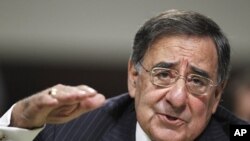The Senate Armed Services Committee has held a hearing on President Barack Obama's nominee to be the next U.S. Secretary of Defense, Leon Panetta. Panetta, the current Central Intelligence Agency Director, was warmly received by the panel, but faced a number of tough questions on his ideas about the size and pace of troop withdrawals from Afghanistan and plans by the president to cut the nation's defense budget.
Both Republican and Democratic lawmakers on the Senate panel quickly made clear in their remarks that Leon Panetta's confirmation to be the next Secretary of Defense by the full Senate is virtually certain. Republican Senator Lindsey Graham of South Carolina praised Panetta and then hit him with rapid fire questions on a number of challenges he will face.
"I just think the president has put together an A-plus national security team, and you are one of the lynchpins of that," said Graham. "So now some hard questions. [Both Graham and Panetta laugh]
Several senators gave Panetta credit for being the person President Obama put in charge of the operation to capture or kill al-Qaida leader Osama bin Laden. Panetta said he believed the killing of bin Laden in May gave the United States the best chance it has had since September 11, 2001 to defeat the al-Qaida terrorist network.
Troop levels in Afghanistan was a major focus of the hearing. President Obama has pledged to begin withdrawing U.S. troops from Afghanistan this July, with a goal of ending U.S. military operations in the country by the end of 2014. Democratic Senate Armed Service Committee Chairman Carl Levin has called on the president to withdraw 15,000 U.S. troops from Afghanistan by the end of this year. Levin quoted the president as saying it is time for Afghans to start taking responsibility for their own future.
"The president has also said that the reductions starting in July will be quote significant, and not just a quote token gesture," said Levin. "I support that decision."
But there were also several senators on the panel worried that the progress achieved during ten years of U.S. forces fighting in Afghanistan could be jeopardized by a hasty pull-out. Republican Senator John McCain of Arizona:
"I would agree with Secretary Gates that any drawdown should be modest so as to maximize our ability to lock in the hard-won gains of our troops through the next fighting season," said McCain.
Panetta refused to be pinned down on whether the reductions of U.S. troops from Afghanistan should be "modest" or "significant", saying only he agrees with the president that they should be "conditions-based."
Several senators expressed concern that any progress in Afghanistan is threatened by the terrorist safe havens in Pakistan, which enable terrorists to constantly cross over the border to attack U.S. and Afghan forces in Afghanistan. Panetta said he shares these concerns, and the Obama administration has conveyed them to the Pakistani government.
"We need to have their cooperation, we need to have their partnership in confronting what frankly is a common enemy here," said Panetta. "You know terrorism just isn't our problem, it is their problem."
Asked about progress in Libya, Panetta said there are signs that military and economic pressure are showing “some signs” of working and that he expects they could force Libyan leader Moammar Gadhafi to step down if the United States and its NATO allies keep up the pressure on him.
If confirmed by the Senate, Panetta would take over the Pentagon at a time when the U.S. is involved in conflicts in Iraq, Afghanistan and Libya, and President Obama has called for an additional $400 billion in cuts to defense spending. Some senators said they do not want military decisions to be dictated by budgetary constraints. Panetta assured the panel that his first and foremost mission will always be to protect the United States.
"I do not believe based on my long experience in government and working with budgets that we have to choose between strong fiscal discipline and strong national defense," he said.
Panetta vowed to eliminate wasteful spending by the Pentagon, and said the country owes it to U.S. service members and their families to give them the best possible benefits and health care.
US Senate Panel Questions Defense Nominee on Troop Withdrawals, Budget Cuts
- By Cindy Saine

















